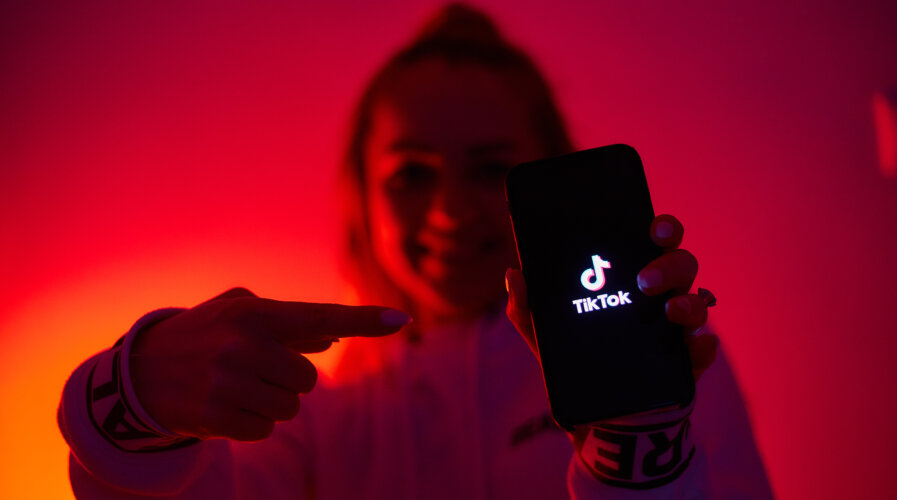
Scammers are generating content on TikTok. (Image – Shutterstock)
Tiktok seeing more content scams
- There has been an increase of scam content on TikTok.
- Scammers are using deepfake videos to lure victims.
- Dating app scammers are also luring victims into crypto scams.
On TikTok, users find themselves watching many types of content, each with its own unique appeal. From TikTok trends to explanatory videos to funny memes, the content on TikTok can be not just addictive, but also influential.
Many users try to mimic existing content on TikTok, especially for videos that have gone viral or become trends. This is nomally harmless – but there has been some content of this kind that was harmful.
Because of that, TikTok has invested in tools to detect and remove such content. But identifying harmful content is still a big challenge, especially with creators continually finding ways to avoid being detected and blocked by the algorithm.
TikTok’s Community Guidelines for content states: “To help ensure a safe, trustworthy, and vibrant experience, we maintain a set of Community Guidelines that include rules and standards for using TikTok. The guidelines apply to everyone and everything on our platform. They are informed by international legal frameworks, industry best practices, and input from our community, safety and public health experts, and our regional Advisory Councils. We evolve them to address emerging risks and potential harms that may occur from new behaviors.”
At the same time, the social media app, which has over 1.67 billion users worldwide, continues to deal with legal issues around the world. The US wants to ban TikTok completely due to concerns that the app is spying on users, with some states already implementing it. A few other countries have also moved to block the app from being used on government devices.
But this is not stopping the social media giant from growing its fan base. And with a large fan base also comes huge advertising opportunities for businesses. According to statistics, TikTok generated US$4 billion from advertising revenue, a figure that is expected to double by 2024 and quadruple by 2026.

TikTok has been flooded with crypto scams.
Scammers are flooding TikTok content
Given the success of TikTok’s reach, it only makes sense for scammers to make use of the platform as well. TikTok content has been proven to be influential, especially in getting users to try new products or even investments. Some users even prefer getting their news on the app instead of relying on actual news websites.
According to a report by Bleeping Computer, TikTok has recently seen a surge of fake cryptocurrency giveaways. The videos seem to be based on Elon Musk. These scams have been around for some time but have resurfaced again on TikTok.
As users scroll through the app, a deepfake video of Musk talking about cryptocurrency appears. While most users would just ignore it, some would continue watching and even click the link on the clip.
The report also stated that scammers have set up hundreds of websites that pretend to be crypto-exchanges or giveaway sites that prompt users to register an account to receive free cryptocurrency. However, as more skeptical observers might expect, these scams simply steal any deposited crypto, with the users receiving nothing in return.
Victims end up losing their money when they try to withdraw the funds they’ve invested in the scam. While it is uncertain how much has been lost to the scams, reports are showing more victims have fallen to such scamming methods on TikTok.

A screenshot of TikTok content featuring the scam.
From TikTok to X, scam content is everywhere
TikTok is not the only social media platform flooded with scam content. Reports show that even X (Twitter) is filled with similar tweets, with the aim of scamming users into investing their funds in crypto scams.
Dating apps are also tricking victims into falling into such scams. A recent report by Sophos highlighted a major pig butchering operation that was utilizing fake trading pools (liquidity pools) of cryptocurrency to steal more than US$1 million.
Sophos X-Ops first learned of this liquidity mining operation from a victim. The victim had connected on the dating app MeetMe with a scammer. Following weeks of conversation, the scammer mixed her romantic promises with persistent attempts to convince the victim to invest in crypto.
The victim opened a Trust Wallet account (a legitimate app for converting dollars to cryptocurrency) and connected to the liquidity pool site the scammer recommended. In reality, the pool site was a fraud site utilizing the brand of Allnodes, an established decentralized finance platform provider, as a cover. After investing US$22,000 in the scheme, the scammers emptied the victim’s digital wallet.
“When we first discovered these fake liquidity pools, they were rather primitive and still developing. Now, we’re seeing scammers taking this particular brand of cryptocurrency fraud and seamlessly integrating it into their existing set of tactics, such as luring targets over dating apps. Very few understand how legitimate cryptocurrency trading works, so it’s easy for these scammers to con their targets,” said Sean Gallagher, principal threat researcher at Sophos.
Gallagher also pointed out that there are even toolkits for this sort of scam now, making it simple for different pig butchering operations to add this type of crypto fraud to their arsenal. In 2022, Sophos tracked dozens of these fraudulent ‘liquidity pool’ sites, and now they’re seeing more than 500.
You can read the full report of this scam here.

Scammers are using dating sites as well. (Image – Shutterstock)
Scammers are getting better at content development
Be it TikTok, Facebook, or even dating sites, scammers are getting better at developing content to lure victims. That’s partly enabled by artificial intelligence (AI). Generative AI tools today can help scammers not only create perfect scam emails but also produce seemingly genuine content.
For dating apps, generative AI can be used to create personalities and even come up with romantic replies to lure victims in. But what makes it even more concerning is the use of deepfake technologies.
Scammers can tamper with pictures of real people and use them to prey on victims. Elon Musk is just one example of a scam on TikTok. For dating sites, scammers could use a deepfake profile pic and even use AI to create a personality to convince their victims to fall for their tricks.
TikTok may be trying to remove such content, but with technology only getting better, it may take a while for it to actually detect deepfakes on its site. The same applies to dating sites.
As such, victims need to be aware of such scams and make sure they don’t fall for them. Background checks and good cybersecurity hygiene practices could eventually save potential victims a lot of money.
Take the video below for example. Just by looking at the content, quality and the watermark, one should be able to know that it’s a deepfake video. Simple checks like that can make a difference.
READ MORE
- Data Strategies That Dictate Legacy Overhaul Methods for Established Banks
- Securing Data: A Guide to Navigating Australian Privacy Regulations
- Ethical Threads: Transforming Fashion with Trust and Transparency
- Top 5 Drivers Shaping IT Budgets This Financial Year
- Beyond Connectivity: How Wireless Site Surveys Enhance Tomorrow’s Business Network




